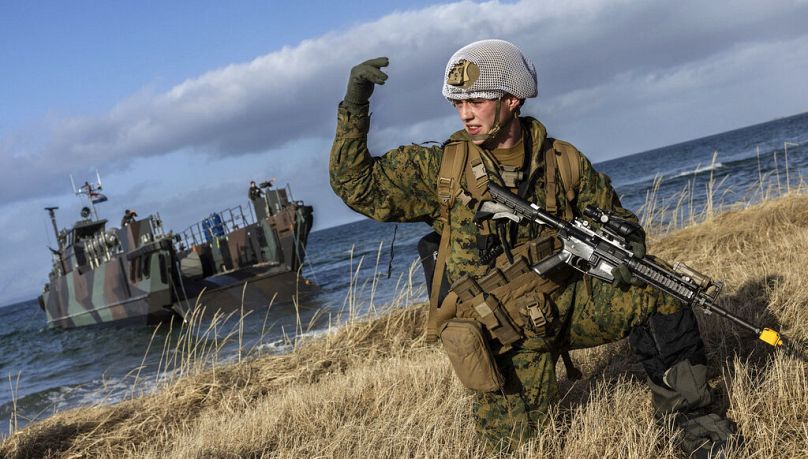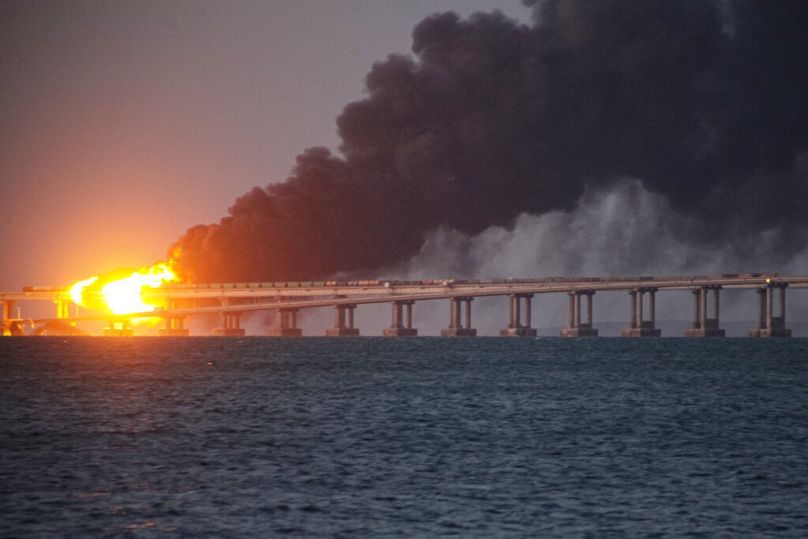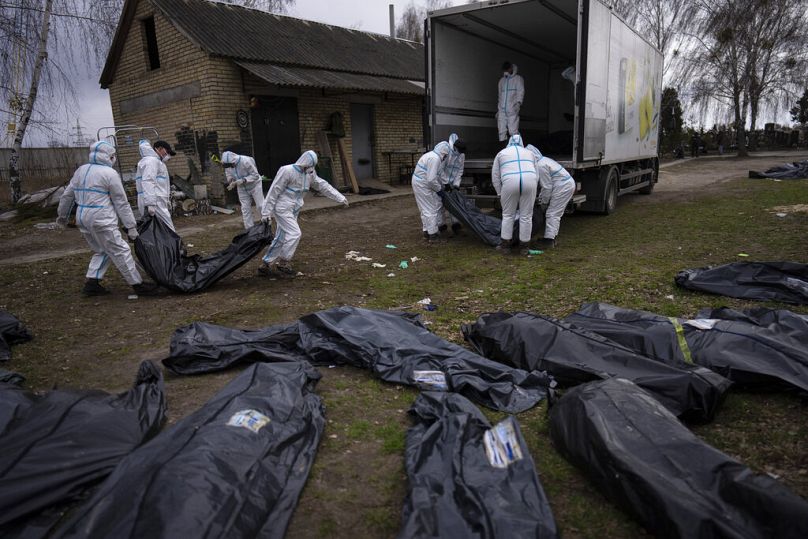These are the latest developments in the Ukraine war you need to know about from the weekend.
This article covers the weekend's events. Click here for Monday's latest developments in the war.
1. Ukraine, Russia trade blame for rocket attacks in Donetsk, Zaporzhizhia regions
Kremlin-installed officials on Sunday blamed Ukraine for a rocket attack that struck the mayor's office in a key Ukrainian city controlled by the separatists.
At the same time, Ukrainian officials said Russian rockets struck a city across from the Zaporizhzhia nuclear power plant, injuring six people.
The attacks on both sides came as Russia has lost ground in the nearly seven weeks since Ukraine's armed forces opened their southern counteroffensive.
The municipal building in separatist-controlled Donetsk was seriously damaged by the rocket attack.
Plumes of smoke swirled around the building, which had rows of blown-out windows and a partially collapsed ceiling. Cars nearby were burned out.
There were no immediate reports of casualties. Kyiv didn't immediately claim responsibility or comment on the attack.
Kremlin-backed separatist authorities have previously accused Ukraine of numerous strikes on infrastructure and residential targets in the occupied regions, often employing the US-supplied long-range HIMARS rockets without providing corroborating information.
Separately, Ukrainian authorities on Sunday reported that at least six people were wounded as a result of rocket attacks across from Zaporizhzhia, Europe's largest nuclear power plant, where Russia has stationed its troops.
Kyrylo Tymoshenko, deputy head of the Ukrainian president's office, said that two residents of Nikopol had been hospitalised following the strikes, which also damaged five power lines, gas pipelines, and a raft of civilian businesses and residential buildings.
2. At least 15 dead, 11 wounded after two men open fire at Russian military range
Two men gunned down a group of Russian soldiers on a military firing range in Belgorod on Saturday, killing 11 and wounding 15, Moscow authorities said.
The Defence Ministry said the two assailants from an unnamed nation in the Commonwealth of the Independent States, which groups nine ex-Soviet republics, were killed by return fire.
The ministry labelled the incident a "terrorist attack".
"During a firearms training session with individuals who voluntarily expressed a desire to participate in (the war), the terrorists opened fire with small arms on the personnel of the unit," RIA cited a defence ministry statement as saying.
Oleksiy Arestovych, an advisor to Ukrainian President Volodymyr Zelenskyy, said in a YouTube interview that the attackers were from the Central Asian nation of Tajikistan and had opened fire on the others after an argument over religion.
3. Mobilisation almost done, no 'massive' strikes planned for Ukraine, says Putin
Russia should be finished calling up reservists in two weeks, President Vladimir Putin said on Friday, promising an end to a divisive mobilisation that has seen hundreds of thousands of men summoned to fight in Ukraine and huge numbers flee the country.
Putin ordered the mobilisation three weeks ago, part of a response to Russian battlefield defeats.
He has also proclaimed the annexation of four partially occupied Ukrainian provinces -- deemed as illegal by the West -- and threatened to use nuclear weapons.
Putin also said Russia had no plans "for now" for more massive air strikes like those it carried out this week, in which it fired more than 100 long-range missiles at targets across Ukraine.
"In the immediate future, there is no need for massive strikes," said Vladimir Putin at a press conference after a regional summit in Kazakhstan. "Currently, there are other objectives. For now. Then we'll see."
He added that Russia was not aiming "to destroy Ukraine".
Putin's remarks come after Russian missiles rained down on a number of Ukrainian cities earlier this week in what he called retaliation for the partial destruction of the Crimean bridge, which Russia blames on Kyiv.
4. First Russian soldiers join Belarus' 'regional grouping' as Lukashenko mulls joining war
The first Russian soldiers assigned to the so-called "regional grouping" arrived in Belarus on Saturday, according to Minsk's ministry of defence.
Earlier this week, Belarusian strongman President Alexander Lukashenko announced that his troops would deploy together with Russian forces near the Ukrainian border.
Lukashenko has claimed that the West and Ukraine are "threatening" Belarus' territory and has appealed to Moscow for help.
This was seen as a potential sign that he may commit his army in support of Russian President Vladimir Putin's flailing aggression against Ukraine.
Belarus allowed itself to be used as a launchpad for Russia's 24 February full-scale invasion of Ukraine but has not joined the fighting directly.
Analysts say Lukashenko would have no choice but to comply if Putin demanded he enters the war at a moment when the Kremlin is reeling from a series of defeats and facing unprecedented public criticism of its generals' failings.
It is unclear whether Belarusian forces could make a difference, however.
Its armed forces total just 48,000 personnel, according to the International Institute for Strategic Studies, and have not fought a war in more than 30 years of independence since the collapse of the Soviet Union.
Ukrainian troops have reinforced their presence on the Belarusian border in response.
5. Irish neutrality under pressure
Ireland must question its long-standing policy of military neutrality following Russia's invasion of Ukraine, European Affairs Minister Thomas Byrne said on Friday.
"In Ireland, we probably need to redefine what defence is," said Byrne during a trip to Paris.
He added Ireland was "not neutral" in the face of the Russian invasion but "neutral" when it came to joining the NATO military alliance while pointing out how the weight of history influenced Dublin's position.
Since gaining independence from the UK in 1922, Ireland has traditionally opted out of military endeavours.
It is not a member of NATO and did not field combat troops in Iraq or Afghanistan, though Irish troops do take part in UN peacekeeping operations.
Dublin's position has come under pressure following the Ukraine war amid possible hybrid attacks on European infrastructure, such as the Nord Stream gas pipeline, and repeated calls from Kyiv for weapons from EU member states.
Suggesting one explanation behind Ireland's military neutrality, Byrne cited the "British conscription attempt" in 1918, when the Irish opposed London's desire to enlist them to fight in the First World War.
This episode "is part of a series of events that led to our independence, and I think this is partly where our neutrality comes from," he said. "It is characterised by the refusal to participate in military alliances."
6. Turkey starts work on Putin's proposed new gas hub
Turkish President Recep Tayyip Erdogan has ordered work to start on a new Russian "gas hub" in Turkey, the country's media reported on Friday.
The hub, first proposed by Putin, will export Russian gas to Europe.
Erdogan told reporters he had ordered the Ministry of Energy "to carry out joint work" with institutions in Russia after a meeting with the Russian president on Thursday.
The Turkish leader said work would begin immediately, adding "there will be no waiting."
He hinted it could be built in the Thrace region of northwestern Turkey, bordering Bulgaria and Greece.
Putin suggested creating a gas hub in Turkey on Thursday, with Russian gas deliveries to the European Union impacted by sanctions and leaks in the Nord Stream 1 and 2 gas pipelines.
The proposal immediately prompted a reaction from France.
"It makes no sense ... to create new infrastructure that would allow us to import more Russian gas," said the French presidency, adding that Europeans wanted to reduce their dependence on Russian energy, not increase it.
Russia already delivers gas to Turkey through the TurkStream pipeline, crossing the Black Sea.
7. Eight months planned to repair Crimean bridge: Moscow
Russia announced on Friday it was giving itself until 1 July 2023 to rebuild the Crimean bridge after it was partially blown up last week.
Russia blamed the blast on Kyiv and retaliated by bombarding Ukraine, though the Ukrainians did not claim responsibility.
The bridge, built at great expense on Putin's orders, is symbolic of Russian power Black Sea region, and it also serves as an essential supply route for Moscow's troops fighting in Ukraine.
Kyiv has neither confirmed nor denied its involvement in this attack, which dealt Russia's prestige in the region a bruising blow.
While Moscow has not detailed the extent of the damage, Russian Prime Minister Mikhail Mishustin signed off a decree for reconstruction to be completed by July, suggesting eight months of work might be needed.
Two road sections of the bridge collapsed into the sea, and the railway section suffered a huge fire after carriages filled with oil caught fire.
Russia partially reopened road and rail traffic on the bridge soon after the blast, but it remains limited due to the damage.
8. Red Crosscalls for 'immediate and unimpeded' access to POWs
The International Committee of the Red Cross (ICRC) called for "immediate and unhindered" access to thousands of prisoners of war from the conflict in Ukraine on Friday.
Many POWs have not been visited by the humanitarian organisation since the start of the war in February.
"Today we share our frustration with the lack of access to all the prisoners of war," said ICRC spokesman Ewan Watson during a UN briefing in Geneva.
He did not give precise figures on the number of POWs captured in the Ukraine war but said there were "thousands of prisoners" who could not receive a visit from the ICRC — a right which is enshrined in the Geneva Convention, governing the laws of war.
The spokesman avoided going into specifics and did not say to what extent the two sides were collaborating with the ICRC.
"Our teams are ready on the ground and have been ready for months to visit [the prison] of Olenivka or any other place of detention of prisoners of war", said Watson.
Olenivka is a prison in the Donetsk region, controlled by pro-Russian separatists, where dozens of captured Ukrainian soldiers recently died in explosions.
Moscow accuses Ukraine of having bombed the camp, but Kyiv claims the Russians massacred the prisoners and then tried to hide their crime.
Euronews cannot independently verify these claims.
The UN has condemned poor conditions in some camps, with a September report by the organisation highlighting that many Ukrainian POWs were suffering from infectious diseases, including hepatitis A and tuberculosis.
Watson said the ICRC "could not force entry" into detention sites, and that it needed not only the green light from the highest authorities but also security guarantees on the ground to avoid putting its teams in danger.
9. UN: Rapes and sexual assaults in Ukraine a 'deliberate tactic'
Rapes and sexual assaults allegedly committed by Russian forces in Ukraine constitute "a military strategy" and "deliberate tactic to dehumanise victims", a UN Special Representative told reporters on Friday.
Pramila Patten denounced "horrible cases and very brutal violence" committed against Ukrainian civilians, claiming "all the indications are there" that rape was being used as a weapon of war.
Euronews cannot independently verify these allegations. Russia repeatedly denies targeting civilians in Ukraine.
"When women and girls are kidnapped for days and raped, when you start raping little boys and men, when you see a series of cases of genital mutilation, when you hear the testimonies of women evoking Russian soldiers equipped with viagra, it is clearly a military strategy," said Patten, a Mauritian lawyer.
"It is clear that it is a deliberate tactic to dehumanise," she added, noting that the first cases of alleged sexual violence in Ukraine surfaced "three days after the start of the invasion".
The UN has verified "more than a hundred cases" of rape and sexual assault in Ukraine since the start of the war in February.
"It's not a question of numbers", said Patten. "It is very complicated to have reliable statistics during an active conflict, and the figures will never reflect reality because sexual violence is a silent crime, the least reported and the least condemned."
"The reported cases represent only the tip of the iceberg," she added.
Victims are primarily women and girls, but also boys and men have also been targeted, according to Patten.
She cited a September report created following a UN Security Council resolution, which she said "confirmed crimes against humanity [had been] committed by Russian forces".
"According to testimonies collected, the age of the victims of sexual violence varies from 4 years to 82 years," Patten added. "There are many cases of sexual violence against children, who are raped, tortured and kidnapped."
10. Russia tries to lure Ukrainian civilians into fleeing to its territory
Russia is promising free accommodation to residents of the partially occupied Kherson region who want to evacuate to Russia, in a sign that continuing Ukrainian military gains along the southern front are worrying the Kremlin.
Russian Deputy Prime Minister Marat Khusnullin made the announcement shortly after the Russia-backed leader of Kherson, one of four Ukrainian regions illegally annexed by Moscow last month, asked the Kremlin to organise an evacuation from four cities in the region.
“Cities of the Kherson region — Kherson and Nova Kakhovka, Hola Prystan and Chornobaivka — are subject to daily missile strikes,” Vladimir Saldo said in a video posted online Thursday.
“These missile strikes cause serious damage, first and foremost to the residents. Among targets missiles hit are hotels, residential buildings, markets — [places] where there are lots of civilians.”
Saldo said a decision had been made to evacuate Kherson residents to the Russian regions of Rostov, Krasnodar and Stavropol, as well as the annexed Crimea.
“I would like to ask you to help organise this process. We, residents of the Kherson region, of course know that Russia doesn’t abandon their own, and Russia always offers a hand,” Saldo said.
His plea comes as Ukrainian forces push their counteroffensive deeper into the southern Kherson region, albeit at a slower pace.
Ukrainian armed forces have reported steady territorial gains along the southern front, including the recapture of 75 settlements in the Kherson region in the last month, the Ministry for Reintegration of Temporarily Occupied Territories said late Thursday night.
Saldo’s deputy, Kirill Stremousov, in his own statement, tried to play down the announcement, saying that “no one’s retreating ... no one is planning to leave the territory of the Kherson region”.
Earlier on Thursday, the British military said on Twitter that “the Russian occupation authorities have likely ordered preparation for the evacuation of some civilians from Kherson”.
“It is likely that they anticipate combat extending to the city of Kherson itself,” the British Defence Ministry said.
Early on Friday, Russia continued its targeted attacks on critical infrastructure across Ukraine, a strategy that started Monday, when a massive, coordinated attack on nearly every region in the country was said to be carried out in retaliation for the explosion on a Moscow-funded bridge linking Crimea to the Russian mainland.














